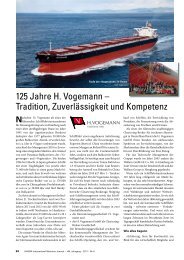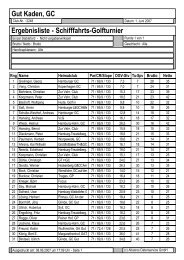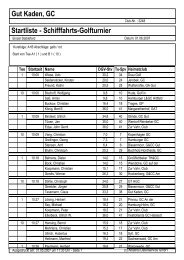You also want an ePaper? Increase the reach of your titles
YUMPU automatically turns print PDFs into web optimized ePapers that Google loves.
Gulf ports of the United States. Shipments of the potash syndicate to these<br />
ports were taken over by Hapag and steamships were chartered from the free<br />
market for this purpose. Of the proceeds, 35 % percent went to H. <strong>Vogemann</strong>,<br />
25 % to Hapag and 20 % each to Rob. M. Sloman jr. and D. Fuhrmann, Nissle<br />
& Günther Nflg. Thirty-five percent of the chartering, handling and loading<br />
of the ships was undertaken by H. <strong>Vogemann</strong>, the remaining steamships were<br />
handled by Sloman and Fuhrmann on Hapag's behalf. This proved to be an<br />
extremely profitable business for us since not only was there a freight difference<br />
in our favour with the chartering system more times than not, what also<br />
paid off was the loading of 35 % of the ships through our stevedore department<br />
which had been established around 1900.<br />
The contract with Hapag was all the more favourable since the<br />
only restrictions placed on us were for the regular Hapag routes whilst we<br />
were able to dispatch to and from the remainder of the Atlantic and Gulf ports<br />
where Hapag were not maintaining a regular service.<br />
100 ships on the list of steamships. After the regular service<br />
between Hamburg and New York had been discontinued as a result of the<br />
contract with the Hamburg-America Line, Mr Gans in New York felt called<br />
upon to undertake far more business from other ports to all the European<br />
ports, for example, to Denmark, France, the Mediterranean, the Black Sea<br />
and so forth, and, in fact, to such an extent that nearly 100 ships were on<br />
our list of steamships by 1906. He procured the necessary money to finance<br />
this using bills of exchange which were drawn against the freights on the<br />
Hamburg company. On the whole, these transactions were not profitable and<br />
ate into a portion of the compensation being paid by Hapag again. In New<br />
York, the big business Mr Gans was making gave him a reputation of being an<br />
extremely clever charterer because he was making freight transactions which<br />
other shippers in New York were unable to make profitable. Of course, they<br />
were unaware that he was only able to make these transactions possible because<br />
he was in a position to recoup his losses through the Hapag payments.<br />
Since neither my father nor Mr Wehner were able to approve<br />
of conducting business in such a manner, something which also put them<br />
in an extremely dangerous financial position – they were of the opinion that<br />
giving away the income raised from Hapag for these speculations was pointless<br />
– considerable differences came about which were finally settled by Mr<br />
Gans leaving the company. His withdrawal could only be achieved though, by<br />
agreeing that the company should be dissolved, but that the remaining own-<br />
Chapter 1 – History of the H. <strong>Vogemann</strong> Company 1886 – 1946 17<br />
Beginning of the great Hamburg<br />
dock strike aimed against<br />
the exploitative working conditions<br />
in the port.<br />
The first modern Olympic<br />
Games, dating back to an idea<br />
of Baron Pierre de Coubertin,<br />
take place in Athens.<br />
1897<br />
After lasting eleven weeks, the<br />
Hamburg dockworkers strike<br />
collapses without any demands<br />
for wage increases and<br />
improved working conditions<br />
being met.<br />
Karl Ferdinand Braun develops<br />
the “Braunsche Röhre” (Braun<br />
Tube = cathode ray fluorescent<br />
tube).<br />
The Krupp-Werke and the<br />
Augsburg Maschinenfabrik<br />
produce the first diesel engines<br />
in collaboration with the<br />
inventor, Rudolf Diesel.






